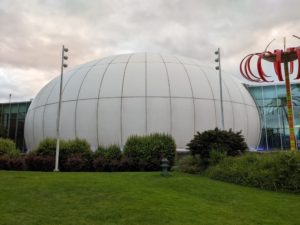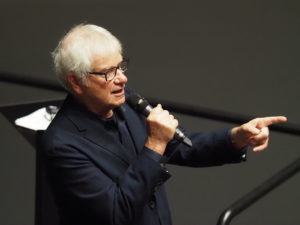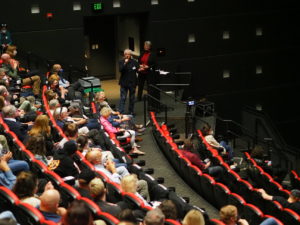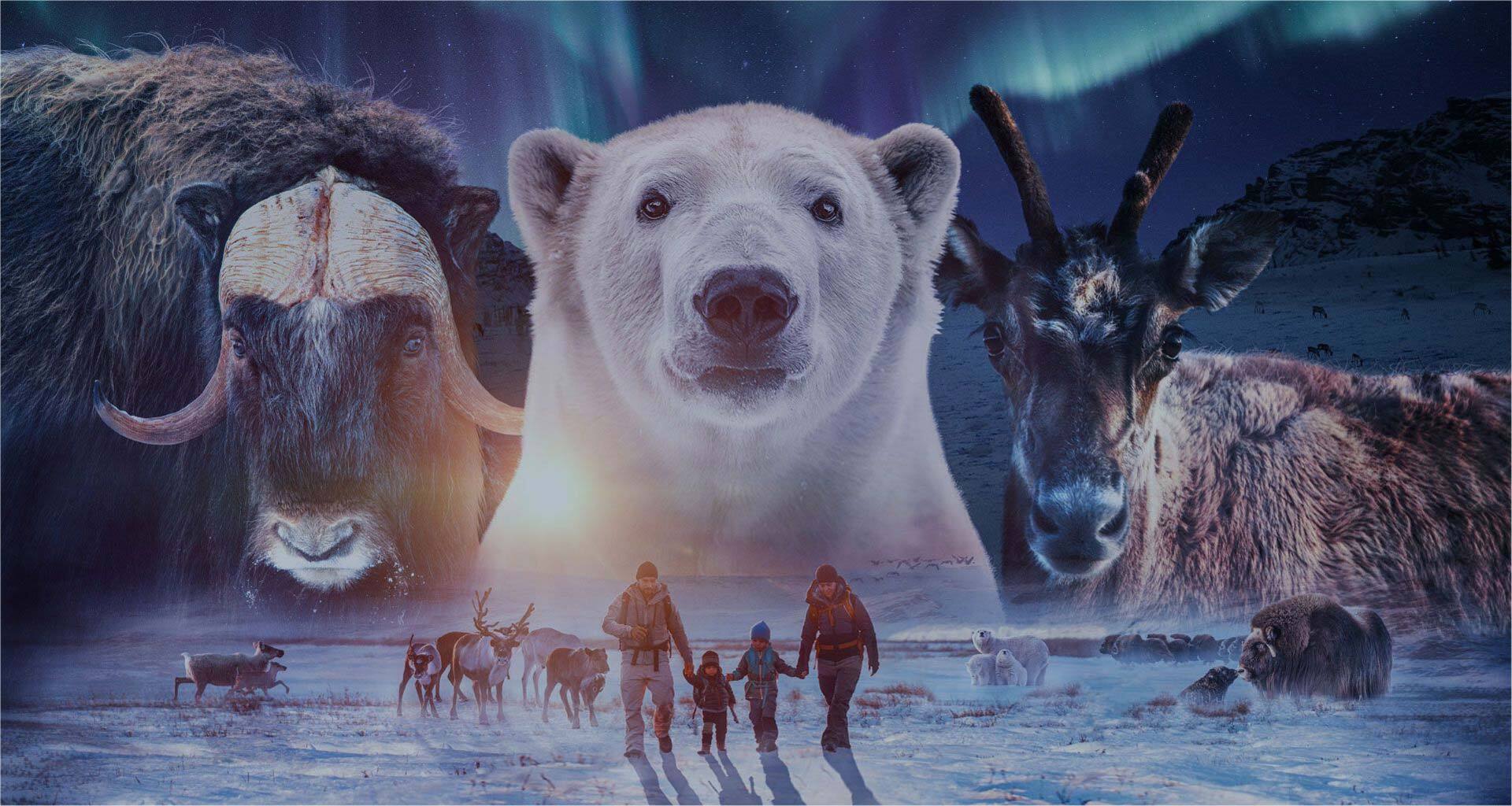The six-story Boeing IMAX Theater screen at our Pacific Science Center was filled by the vast, thousand-mile migration of 115,000 animals of the Porcupine Caribou Herd in Alaska’s Arctic National Wildlife Refuge, a landscape once regrettably described as “flat white nothingness” by United States Interior Secretary Gale Norton during the administration of George W. Bush.

The camera lens has been conservationists’ equalizing weapon in a decades-long struggle to keep the Refuge from falling into the clutches of Big Oil.
A fifteen-year-old nonprofit publisher named Braided River, an offshoot of Mountaineers Books, has stirred the public’s consciousness, first with the book “Arctic National Wildlife Refuge: Seasons of Life and Land,” and more recently on the big screen “The Arctic: Our Last Great Wilderness.”
Braided River has also celebrated the salmon as a life-giving resource in Alaska, with a book “The Salmon Way” and an exhibit of photographer Amy Gulick’s work at the Seattle Aquarium. It has focused on rapid, alarming melting of permafrost in the Arctic (“The Big Thaw”) and the Northwest’s critically endangered mountain caribou (“Caribou Rainforest”).
A Braided River Solstice Bash, last week at the Science Center, put the focus on people who have turned out these remarkable works.
It was hosted by the publisher’s creator-chief executive Helen Churillo, philanthropist Tom Campion – whose Campion Advocacy Fund underwrote the film — and photographer Florian Schulz, whose lenses have captured gray whales in the Pacific, grizzly bears in the Rockies, and musk oxen in the Arctic.
These folks are playing a long game. So often, nowadays, the word “demand” is featured in progressives’ advocacy. Impatience leads to strategic mistakes.
On many fronts, however, copious persuasion is required.
The Arctic is a case in point, long viewed as a landscape suitable only for exploitation, to open pit mines and oil drilling platforms.
The U.S. Forest Service long saw Southeast Alaska’s 16.7‑million-acre Tongass National Forest as a supplier of old growth trees to pulp mills in Ketchikan and Sitka. (A third was planned for Juneau.)

I met Tom Campion a quarter-century ago, part of a rain-drenched Pilchuck Audubon Society picket line outside a fundraiser featuring then-House Speaker Newt Gingrich. It seemed an unusual venue for the co-founder of Zumiez, a vastly popular young peoples’ clothing/gear outlet that sells more skateboards and snowboards than anybody else.
He’s done well, and (with wife Sonya) done a great deal of good, including supporting the work of the Northwest Progressive Institute.
A galvanizing episode, two decades ago, was Subhankar Banerjee’s book on the Arctic Refuge. The young Boeing employee catalogued life in the Refuge, including the dead of winter. Senator Barbara Boxer, D‑California, erected easels on the Senate floor, using Banerjee’s photos to argue against opening the Coastal Plain of the Refuge to oil drilling.
Retaliation was swift. The Smithsonian scaled back an exhibit from the book. Banerjee’s pictures decorated a corridor leading to a loading dock. Messages, including words of ex-President Jimmy Carter, were deleted. The reaction was more swift: Museums around the country booked exhibits from the Refuge.
Campion started taking political figures to and showing films about the Refuge. Senator Maria Cantwell spied both a wolverine and barren ground grizzly bear through a spotting scope. Former President Carter paid a visit, igniting denunciations from Alaska’s drill-baby-drill politicians.
Senate Majority Leader Chuck Schumer has seen Schulz’s film.
I drove around the southern Selkirks, in north Idaho and British Columbia, with Florian Schultz in 2002. The young German photographer, whose mountains at home are developed and organized, fell in love with the wide open spaces of North America. With his book “Freedom to Roam,” Florian made the case for wildlife corridors up and down the Rockies, to prevent the isolation of populations of birds and mammals.

Campion has nurtured Schulz, from early day repairs to both Florian’s Volkswagen bus and his bad back, nowadays to the bush planes used in photographing the Porcupine Caribou Herd.
Helen Churillo, at Braided River, has help spotlighted such talent as photographer Steve Kazlowski, who chronicles the life of polar bears, and science scribe Eric Scigliano, who immersed himself in Siberia writing The Big Thaw.
Certain Braided River books are joyously celebratory.
An example: Paul Bannick’s “The Owl and the Woodpecker,” and Bannick’s subsequent study of Great Snowy Owls. At holiday season, Bannick’s owl books make for a gift that is intelligent but also entrances young readers.
The Arctic Refuge has survived periods of great danger.
With heavy lobbying by Big Oil, the first Bush administration was on the cusp of getting Congress to allow drilling. Then the tanker Exxon Valdez hit Bligh Reef and fouled Alaska’s Prince William Sound. Nearly thirty years later, a backdoor provision was slipped into the 2017 Trump tax scam bill to create a legal path to drilling. (Cantwell tried to remove it, and lost in the Senate on a 52–48 vote.)
The Trump regime rushed to sell oil leases just before leaving office. Surprise! Major oil companies did not bid, mindful of public opposition and the prospect of years of lawsuits. One small firm that did bid has since pulled out. The Biden-Harris administration has declared a moratorium on lease development.
A substantial political donor, Tom Campion was able to break bread recently with President Biden. He used the time to lobby against the Willow Project, a major oil development proposed by Conoco-Phillips just west of Prudhoe Bay.
With rising gas prices, the oil industry and Republicans in Congress have again taken up Sarah Palin’s cry of “Drill, baby, drill.” No matter that oil companies are sitting on thousands of leases that they haven’t developed. Or that the Keystone Pipeline was designed to transport dirty Alberta oil to the Gulf Coast for export.
The drilling message is drilled home daily by Representative Cathy McMorris Rodgers, R‑Washington, who stands to chair the powerful House Energy and Commerce Committee, should Republicans regain control this November.
The struggle to protect wild places will go on.
As the late Sierra Club leader David Brower observed, conservationists cannot afford to lose even once. I’ve rafted the Canning River, which marks the western boundary of the Arctic Refuge. On the west side, abandoned rusty oil drums, years-old vehicle tracks on the tundra. Oil exploration would bring drilling platforms, haul roads and pipelines to the “last great wilderness.”
Here’s wishing a happy anniversary and long life to Braided River. It is the creation of folks with music in their souls. Its books and exhibits change minds.

